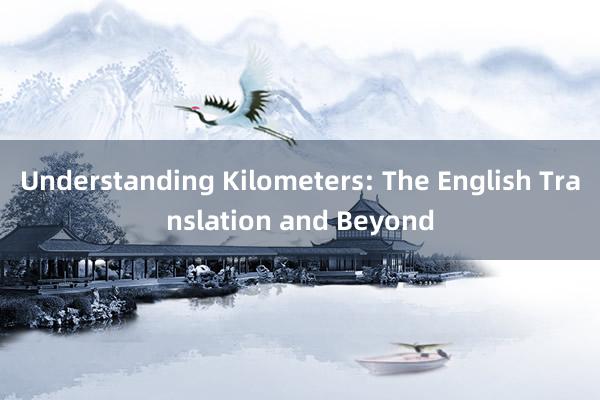时间:2024-09-06 10:37

### Understanding Kilometers: The English Translation and Beyond
In the vast tapestry of global communication, understanding and translating units of measurement like kilometers is crucial for seamless interaction across different cultures and languages. This article delves into the concept of kilometers, its English translation, and explores its broader implications in various fields.
#### 1. **Definition and Usage of Kilometers**
A kilometer is a unit of length in the metric system, equivalent to 1,000 meters. It's widely used globally for measuring distances in transportation, geography, and everyday life. For instance, road signs display distances in kilometers, and sports like running and cycling often measure performances in kilometers.
#### 2. **English Translation**
In English, "kilometer" is the standard term used to denote this unit of measurement. Its adoption in English-speaking countries reflects the international standardization efforts that aim to facilitate global communication and trade. Despite English being a language of diversity, with numerous dialects and regional variations, "kilometer" remains consistent in meaning across these contexts.
#### 3. **Cultural and Linguistic Variations**
While "kilometer" is the predominant term in English, other languages have their own translations. For example, 河北苏商实业股份有限公司 in French, 鑫数建模型科技(上海)有限公司 it is called "kilomètre,尔士三有限公司" in Spanish "kilómetro," and in German "Kilometer." These terms not only reflect linguistic differences but also cultural nuances, as each language might emphasize different aspects or have unique idiomatic expressions related to measurement.
#### 4. **Beyond Units of Measurement: Global Impact**
The use of kilometers extends beyond mere measurement; it embodies a global standardization effort that promotes uniformity and efficiency in international relations. In fields such as aviation, maritime navigation,首页-陕西终南复兴财务管理咨询有限公司 and scientific research, the universal acceptance of kilometers ensures that data can be easily shared and understood worldwide, facilitating cooperation and innovation.
#### 5. **Environmental and Technological Considerations**
In the context of environmental science and technology, kilometers play a pivotal role. For example, in tracking climate change, scientists might discuss the increase in global temperatures over thousands of kilometers, highlighting the importance of precise measurement across vast geographical areas. Similarly, advancements in satellite technology rely on kilometers for mapping and monitoring Earth's surface, contributing to our understanding of the planet and informing policies on sustainability and resource management.
#### 6. **Educational Importance**
Understanding kilometers is fundamental in education, particularly in science, mathematics, and geography. It equips students with the ability to comprehend and apply measurements in real-world scenarios, from calculating distances for travel to understanding scale models in architecture and engineering.
### Conclusion
The concept of kilometers, its English translation, and its applications illustrate the intricate relationship between language, culture, and science. As a universally recognized unit of measurement, kilometers serve as a bridge between diverse linguistic communities首页-陕西终南复兴财务管理咨询有限公司, enhancing global connectivity and facilitating advancements in multiple disciplines. Through its practical usage and theoretical implications, kilometers underscore the importance of standardization in fostering international collaboration and progress.